-
ORIGINAL ARTICLE11-22-2024
Temporal trends in neonatal mortality in Pernambuco
Revista Brasileira de Enfermagem. 2024;77(4):e20230451
Abstract
ORIGINAL ARTICLETemporal trends in neonatal mortality in Pernambuco
Revista Brasileira de Enfermagem. 2024;77(4):e20230451
DOI 10.1590/0034-7167-2023-0451
Views0See moreABSTRACT
Objective:
To verify the temporal trend of neonatal mortality in the health regions of Pernambuco between 2000 and 2020.
Method:
A time-series ecological study was conducted, analyzing the total neonatal mortality rate and its early and late components. For regression analysis, Joinpoint Regression was applied, trends were classified, and annual and average percentage changes were calculated for the period, with a significance level of 95%.
Results:
The average neonatal mortality rate in Pernambuco was 11.5 during the studied period. A decreasing trend in neonatal mortality rate was observed, especially in the early component. The region where the state capital is located showed the fastest decrease across all components.
Conclusion:
The temporal trend of neonatal mortality was decreasing; however, the rate of reduction was not uniform across the health regions of the state, and the implementation of the Mãe Coruja Pernambucana Program did not impact the trend in neonatal mortality.
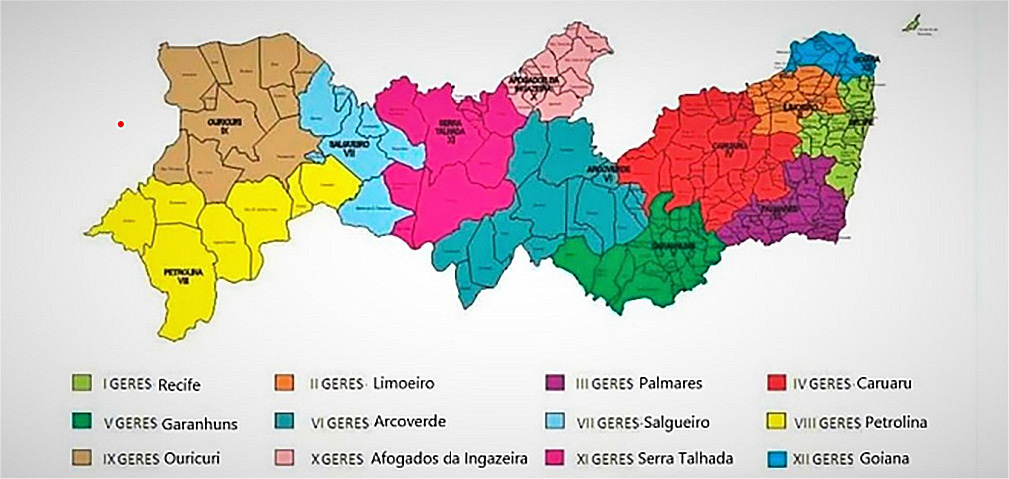
-
ORIGINAL ARTICLE11-22-2024
Evaluation of a video to promote HIV testing in sexual minorities
Revista Brasileira de Enfermagem. 2024;77(4):e20230320
Abstract
ORIGINAL ARTICLEEvaluation of a video to promote HIV testing in sexual minorities
Revista Brasileira de Enfermagem. 2024;77(4):e20230320
DOI 10.1590/0034-7167-2023-0320
Views0ABSTRACT
Objective:
To design and evaluate an educational video aimed at promoting HIV testing in gay men from the theoretical perspective of the Nola J. Pender Health Promotion Model.
Methods:
The design comprised five steps: 1.- Literature search; 2.- Formulation of the educational objective; 3.- Drafting of the script and location of the information in the theoretical components; 4.- Production; and 5.- Evaluation by experts and the target population.
Results:
The video “Living Without Fear” was produced, which presents the dilemma faced by gay men before taking a HIV test. The content validity index was 0.85, which indicated that the information was adequate and acceptable for promoting the rapid HIV test.
Final Considerations:
The results contribute to the scientific evidence aimed at promoting healthy behavior. In addition, the video was shown to be an acceptable educational tool.
Keywords:Audiovisual ResourcesHIV TestingInstructional Film and VideoSexual and Gender MinoritiesValidation StudySee more -
ORIGINAL ARTICLE11-22-2024
Development and validity of a mobile application prototype for hospital shift handover
Revista Brasileira de Enfermagem. 2024;77(4):e20230173
Abstract
ORIGINAL ARTICLEDevelopment and validity of a mobile application prototype for hospital shift handover
Revista Brasileira de Enfermagem. 2024;77(4):e20230173
DOI 10.1590/0034-7167-2023-0173
Views0ABSTRACT
Objective:
To develop and validate a mobile application prototype for nursing shift handover in a hospital inpatient unit.
Methods:
A methodological study of technological production, carried out from April 2020 to January 2022, for mobile application construction and validity through the Design Thinking methodology. The study involved the stages of prototype development and validity by experts.
Results:
The application for mobile nursing shift handover obtained a usability score of 79 points and a content validity coefficient of 0.7.
Conclusions:
The instrument obtained an excellent assessment according to usability and agreement among experts. However, future studies are needed to implement this technology in order to assess effectiveness, time optimization and failures during communication.
Keywords:Health Information ExchangeHealth TechnologyHospitalizationMobile ApplicationsSoftware ValidationSee more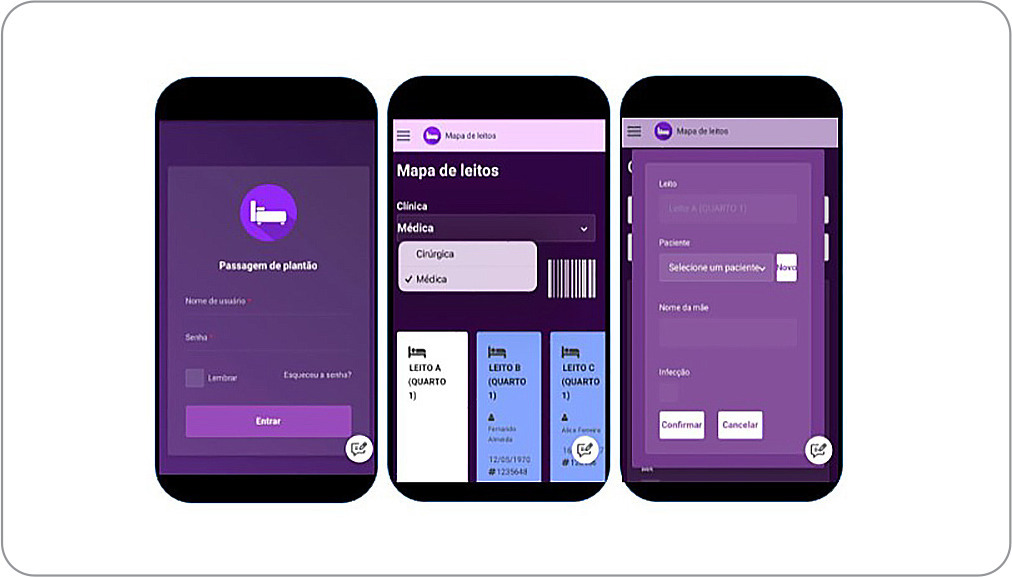
-
ORIGINAL ARTICLE10-25-2024
Analysis of the vaccination situation against Mpox in people living with HIV/AIDS: an ecological study
Revista Brasileira de Enfermagem. 2024;77(5):e20230234
Abstract
ORIGINAL ARTICLEAnalysis of the vaccination situation against Mpox in people living with HIV/AIDS: an ecological study
Revista Brasileira de Enfermagem. 2024;77(5):e20230234
DOI 10.1590/0034-7167-2023-0234
Views0See moreABSTRACT
Objectives:
to analyze the vaccination situation against Mpox in people living with HIV/AIDS in Brazil.
Methods:
an ecological study on the vaccination status against Mpox in people living with HIV/AIDS (PLWHA) in Brazil. The data were collected in April 2023 through information from the Ministry of Health, using the “Microsoft app Power BI,” which is publicly accessible.
Results:
the data analysis revealed that in Brazil, 2,978 doses of the MVA-BN Jynneos Mpox vaccine were administered in PLWHA, resulting in a vaccination coverage of 18.3%, with the southern and southeastern regions showing the lowest and highest vaccination coverage, respectively. Gender-based evaluation showed a higher proportion of vaccinated males.
Conclusions:
we identified low vaccination coverage in all regions of Brazil, highlighting the need for intensified vaccination activities, especially for PLWHA.
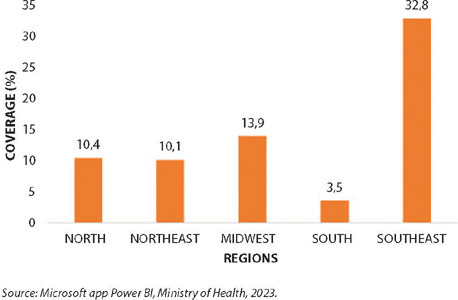
-
ORIGINAL ARTICLE10-11-2024
Indigenous women’s experiences about the pregnancy-puerperal cycle
Revista Brasileira de Enfermagem. 2024;77:e20230410
Abstract
ORIGINAL ARTICLEIndigenous women’s experiences about the pregnancy-puerperal cycle
Revista Brasileira de Enfermagem. 2024;77:e20230410
DOI 10.1590/0034-7167-2023-0410
Views0See moreABSTRACT
Objectives:
to understand the experiences of indigenous women regarding the pregnancy-puerperal cycle.
Methods:
qualitative, exploratory and descriptive research, carried out between May and August 2023 with 27 pregnant women from Indigenous Villages in Mato Grosso, Brazil, through open individual interviews. The data was analyzed using Reflexive thematic analysis.
Results:
data analysis resulted in the following themes: Cultivation of labor and birth in its natural and sacred path; Unique practices and beliefs associated with breastfeeding; Evolved or reductive thinking? The participants suggest inviolable practices and beliefs, which must be welcomed, respected and enhanced by indigenous health teams.
Final Considerations:
the experiences of indigenous women regarding the pregnancy-puerperal cycle are unique and motivated by inviolable cultural and religious beliefs, which transcend scientific knowledge, certainties and the linearity of contemporary approaches, normally established as order.
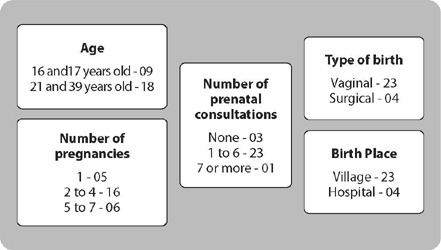
-
REVIEW10-07-2024
Risk factors associated with the occurrence of the adverse event phlebitis in hospitalized adult patients
Revista Brasileira de Enfermagem. 2024;77(5):e20240162
Abstract
REVIEWRisk factors associated with the occurrence of the adverse event phlebitis in hospitalized adult patients
Revista Brasileira de Enfermagem. 2024;77(5):e20240162
DOI 10.1590/0034-7167-2024-0162
Views0See moreABSTRACT
Objectives:
to synthesize knowledge regarding risk factors associated with occurrence of adverse event phlebitis in hospitalized adult patients.
Methods:
an integrative literature review, carried out in the CINAHL, PubMed, Virtual Health Library, Embase, Web of Science and Scopus databases. The stages were carried out independently by two reviewers, and the data were analyzed descriptively.
Results:
from the analysis of 31 quantitative primary studies, the following risk factors were summarized: length of stay; use of antibiotics; peripheral intravenous catheter dwell time; receive less nursing care; catheter inserted multiple times; patients with infection and comorbidities; presence of pain at catheter insertion site; Teflon® catheter use; reduced patient mobility; quality of patient’s vein; skin elasticity; unsuccessful insertion.
Conclusions:
it is necessary to standardize the format for measuring occurrence of this adverse event and develop new studies with a higher level of evidence.
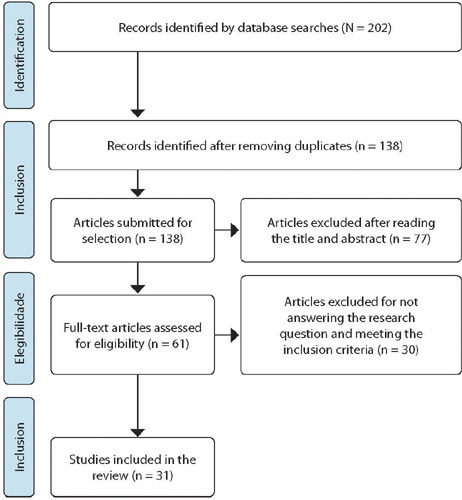
-
ORIGINAL ARTICLE10-07-2024
Indicators of emotional distress and mindfulness in undergraduate students: a cross-sectional study
Revista Brasileira de Enfermagem. 2024;77(5):e20230499
Abstract
ORIGINAL ARTICLEIndicators of emotional distress and mindfulness in undergraduate students: a cross-sectional study
Revista Brasileira de Enfermagem. 2024;77(5):e20230499
DOI 10.1590/0034-7167-2023-0499
Views0See moreABSTRACT
Objectives:
to assess the association between indicators of emotional distress and dispositional mindfulness in health students at a Brazilian federal public university.
Methods:
a cross-sectional study, developed with university students in the health area of a public institution from May to June 2022. In the analysis, multiple linear regression was used using SPSS software.
Results:
the sample was mostly female, ≤ 22 years old, non-white, studying the first semesters, with a higher prevalence for the medicine course. Students presented moderate dispositional mindfulness scores. It was observed that the variables of stress, depression and current suicide risk were associated with the capacity for mindfulness.
Conclusions:
knowing the indicators of emotional distress that are related to the potential of mindfulness can contribute as a situational diagnosis to better design strategies that promote the improvement of emotional indicators of health students.
-
ORIGINAL ARTICLE10-07-2024
Development and validation of a mobile application prototype for postoperative cardiac surgery
Revista Brasileira de Enfermagem. 2024;77(5):e20230491
Abstract
ORIGINAL ARTICLEDevelopment and validation of a mobile application prototype for postoperative cardiac surgery
Revista Brasileira de Enfermagem. 2024;77(5):e20230491
DOI 10.1590/0034-7167-2023-0491
Views0See moreABSTRACT
Objectives:
to develop and validate the content, appearance, and semantics of a prototype application for monitoring patients in the postoperative period of cardiac surgery.
Methods:
this is a technological development study based on Contextualized Instructional Design. The content and appearance evaluation was conducted by a committee of specialists, and semantic validation was carried out by patients from a cardiac surgery outpatient clinic.
Results:
the application prototype consisted of 43 screens, validated by 17 health specialists, with content validity ratio and appearance validity index results of 0.86 and 0.99, respectively. For semantic validation, 10 patients participated in data collection, with a total content validity index of 0.978.
Conclusions:
the prototype of the “VivaCor PósOp” application demonstrated evidence of content, appearance, and semantic validity, with the potential to stimulate self-care in patients in the postoperative period of cardiac surgery.
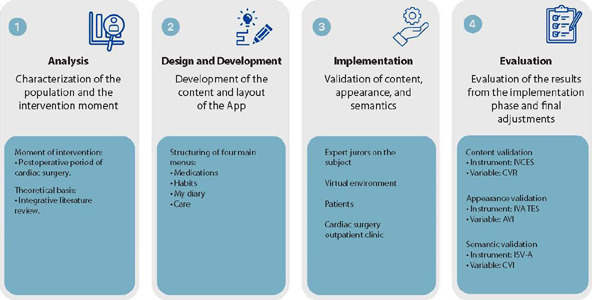
-
EDITORIAL03-08-2024
A enfermagem como protagonista no enfrentamento da hesitação e recusa vacinal
Revista Brasileira de Enfermagem. 2024;77:e77suppl101
Abstract
EDITORIALA enfermagem como protagonista no enfrentamento da hesitação e recusa vacinal
Revista Brasileira de Enfermagem. 2024;77:e77suppl101
DOI 10.1590/0034-7167.202477suppl101pt
Views0Desde a década de 1970, o Ministério da Saúde do Brasil instituiu o Programa Nacional de Imunização (PNI), que precedeu o Sistema Único de Saúde e que lhe foi incorporado e fortalecido, devido ao modelo descentralizado aos municípios, mas de comando único ao nível central. Seu objetivo era e ainda é coordenar as ações de […]See more -
EDITORIAL03-08-2024
Nursing as a player in tackling vaccine hesitancy and refusal
Revista Brasileira de Enfermagem. 2024;77:e77suppl101
Abstract
EDITORIALNursing as a player in tackling vaccine hesitancy and refusal
Revista Brasileira de Enfermagem. 2024;77:e77suppl101
DOI 10.1590/0034-7167.202477suppl101
Views1Since the 1970s, the Brazilian Ministry of Health established the Brazilian National Immunization Program (PNI – Programa Nacional de Imunização), which preceded the Brazilian Health System and which was incorporated and strengthened due to the decentralized model to municipalities, but under single command at central level. Its objective was and still is to coordinate vaccination […]See more -
EDITORIAL02-26-2024
Enfermeiro Navegador de Pacientes com Câncer: contribuições para a discussão no cenário nacional
Revista Brasileira de Enfermagem. 2024;77(2):e770201
Abstract
EDITORIALEnfermeiro Navegador de Pacientes com Câncer: contribuições para a discussão no cenário nacional
Revista Brasileira de Enfermagem. 2024;77(2):e770201
DOI 10.1590/0034-7167.2024770201pt
Views0A prática profissional da navegação de pacientes é algo incipiente no Brasil e, sendo assim, é indispensável uma ampla discussão com vários setores da sociedade, sendo essa a principal propositura deste editorial. Comecemos pela história.A navegação de pacientes foi definida em 1989 como uma intervenção de prestação de serviços baseada na comunidade, com o objetivo […]See more -
EDITORIAL02-26-2024
Nurse Navigator of Cancer Patients: contributions to the discussion on the national stage
Revista Brasileira de Enfermagem. 2024;77(2):e770201
Abstract
EDITORIALNurse Navigator of Cancer Patients: contributions to the discussion on the national stage
Revista Brasileira de Enfermagem. 2024;77(2):e770201
DOI 10.1590/0034-7167.2024770201
Views0The professional practice of patient navigation is incipient in Brazil and, therefore, a broad discussion with various sectors of society is essential, which is the main purpose of this editorial. Shall we start with the story.Patient navigation was defined in 1989 as a community-based service delivery intervention aimed at appropriately promoting access to diagnosis and […]See more -
ERRATUM02-26-2024
ERRATUM
Revista Brasileira de Enfermagem. 2024;77(1):e2024n1e02
Abstract
ERRATUMERRATUM
Revista Brasileira de Enfermagem. 2024;77(1):e2024n1e02
DOI 10.1590/0034-7167.20247701e02
Views0In the article “Active teaching model to promote critical thinking”, with DOI number: , published in Revista Brasileira de Enfermagem, 2019;72(1):293-8, on page 297:Include before REFERENCES:[…]See more -
REVIEW02-26-2024
Practice of immersion in hot water to relieve pain in neonatology: an integrative review
Revista Brasileira de Enfermagem. 2024;77(1):e20230260
Abstract
REVIEWPractice of immersion in hot water to relieve pain in neonatology: an integrative review
Revista Brasileira de Enfermagem. 2024;77(1):e20230260
DOI 10.1590/0034-7167-2023-0260
Views0See moreABSTRACT
Objectives:
to identify immersion use in hot water to relieve pain in newborns.
Methods:
an integrative literature review, carried out in the PubMed, VHL, EMBASE, Scopus, CINAHL, Cochrane and SciELO databases, with investigations in English, Spanish, French or Portuguese, published between 2002 and 2022. The Health Sciences Descriptors (DeCS) and Medical Subject Headings (MeSH) were used to answer the following question: what are the uses of hot water immersion in relieving pain in newborns?
Results:
nine studies were included, mainly Brazilian, experimental, with a predominance of strong and moderate levels of evidence. Hydrotherapy and bath use (immersion and bandaging) was observed, promising interventions in reducing pain scores, assessed using scales, physiological and endocrine parameters.
Conclusions:
hot water proved to be a promising non-pharmacological intervention in relieving pain in infants in different contexts.

-
ORIGINAL ARTICLE02-26-2024
Artificial intelligence to predict bed bath time in Intensive Care Units
Revista Brasileira de Enfermagem. 2024;77(1):e20230201
Abstract
ORIGINAL ARTICLEArtificial intelligence to predict bed bath time in Intensive Care Units
Revista Brasileira de Enfermagem. 2024;77(1):e20230201
DOI 10.1590/0034-7167-2023-0201
Views0See moreABSTRACT
Objectives:
to assess the predictive performance of different artificial intelligence algorithms to estimate bed bath execution time in critically ill patients.
Methods:
a methodological study, which used artificial intelligence algorithms to predict bed bath time in critically ill patients. The results of multiple regression models, multilayer perceptron neural networks and radial basis function, decision tree and random forest were analyzed.
Results:
among the models assessed, the neural network model with a radial basis function, containing 13 neurons in the hidden layer, presented the best predictive performance to estimate the bed bath execution time. In data validation, the squared correlation between the predicted values and the original values was 62.3%.
Conclusions:
the neural network model with radial basis function showed better predictive performance to estimate bed bath execution time in critically ill patients.
-
REVIEW02-26-2024
Evidence of intrauterine device insertion by nurses in Primary Health Care: an integrative review
Revista Brasileira de Enfermagem. 2024;77(1):e20230134
Abstract
REVIEWEvidence of intrauterine device insertion by nurses in Primary Health Care: an integrative review
Revista Brasileira de Enfermagem. 2024;77(1):e20230134
DOI 10.1590/0034-7167-2023-0134
Views0ABSTRACT
Objectives:
to synthesize and analyze evidence on intrauterine device insertion by nurses in Primary Health Care.
Methods:
an integrative review, carried out in the BDENF, CINAHL, LILACS, SciELO, Scopus, PubMed and Web of Science databases in June 2022, delimiting the period from 1960 to 2022.
Results:
141 articles were identified in the initial search, and 10 studies made up the final sample. Four (40%) were developed in the United States and one (10%) in Brazil, with publications from 1979 to 2021. The findings were grouped into three categories: Nurse training to insert an intrauterine device; Nurses’ competency to insert an intrauterine device; and Women’s access to intrauterine devices.
Conclusions:
nurse theoretical and practical training is a prominent element, consolidated in the favorable outcomes of insertions performed by nurses and satisfaction among women, a practice that has expanded access to the contraceptive method in Primary Health Care.
Keywords:Advanced Practice NursingIntrauterine DevicesLong-Acting Reversible ContraceptionNursesPrimary Health CareSee more
-
ORIGINAL ARTICLE10-06-2023
Nursing students’ professional values for reinforcing the professional identity
Revista Brasileira de Enfermagem. 2023;76:e20220338
Abstract
ORIGINAL ARTICLENursing students’ professional values for reinforcing the professional identity
Revista Brasileira de Enfermagem. 2023;76:e20220338
DOI 10.1590/0034-7167-2022-0338
Views0ABSTRACT
Objectives:
to understand the nursing students’ professional values in different Brazilian universities and verify a correlation between the “Professional Value” and the sociodemographic variables.
Methods:
quantitative, cross-sectional, and descriptive study conducted through an electronic questionnaire with a Professional Values Scale (NPVS-3). Participants were Nursing students of all semesters from three universities – two in the Southeast region and one in the North region.
Results:
of the 337 participating Nursing students, 282 were female. The Caring dimension presented the highest score (mean=46.61), and Professionalism, the lowest score (mean=34.65). A statistically significant association was detected between the Caring dimension, “university where is attending,” and “gender.”
Conclusions:
the results indicate the Caring dimension as the one containing the most scored professional values since the nurses’ training, and the relation of those values in such dimension is more significant in the female sample.
Keywords:Code of EthicsKnowledge ManagementNursing EthicsNursing StudentsRole of the Nursing ProfessionalSee more -
EDITORIAL10-06-2023
Pesquisa Translacional em Saúde: para onde vamos?
Revista Brasileira de Enfermagem. 2023;76(5):e760501
Abstract
EDITORIALPesquisa Translacional em Saúde: para onde vamos?
Revista Brasileira de Enfermagem. 2023;76(5):e760501
DOI 10.1590/0034-7167.2023760501pt
Views0Os contributos das pesquisas científicas são incontestáveis para o avanço da ciência e para a sociedade. Por isso, cada vez mais reflexões acerca dos impactos e da aplicabilidade dos estudos têm permeado o centro das discussões em nível global, sobretudo diante do aumento crescente da produção de conhecimentos. Nesse cenário, a translação da pesquisa (TP) […]See more -
EDITORIAL10-06-2023
Translational Health Research: where are we going?
Revista Brasileira de Enfermagem. 2023;76(5):e760501
Abstract
EDITORIALTranslational Health Research: where are we going?
Revista Brasileira de Enfermagem. 2023;76(5):e760501
DOI 10.1590/0034-7167.2023760501
Views0The contributions of scientific research are undeniable for the advancement of science and for society. Therefore, more and more reflections on the impacts and applicability of studies have permeated the center of discussions at a global level, especially considering the growing increase in knowledge production. In this scenario, research translation (RT) has a notable importance […]See more -
Advanced Practice Nursing: “Training” Pillar in Supporting the Proposal in Brazil
Revista Brasileira de Enfermagem. 2023;76(5):e20230118
Abstract
Advanced Practice Nursing: “Training” Pillar in Supporting the Proposal in Brazil
Revista Brasileira de Enfermagem. 2023;76(5):e20230118
DOI 10.1590/0034-7167-2023-0118
Views0ABSTRACT
Objectives:
to present the pillars that support what has been called Advanced Practice Nursing and discuss the necessary training for its implementation.
Methods:
elements contained in assessment documents for graduate programs proposals, reports of presentations by international professors in countries and selected scientific publications were gathered to compose the argument.
Results:
practice/competency (adds broad and in-depth knowledge about health processes and scientific evidence, clinical reasoning and clinical skills for therapeutic indications); 3) professional regulation (corresponding legislation and monitoring); and 4) funding (broad training and professional practice policy).
Final Considerations:
the agenda for implementing Advanced Practice Nursing in Brazil involves joining efforts to identify stakeholders for a work to legitimize their importance in the country’s health and education overview.
Keywords:Advanced Practice NursingEducationGraduateHealth Postgraduate ProgramsNursingNursing EducationPublic PolicySee more
-
ORIGINAL ARTICLE10-06-2023
Quality of health care in Primary Care: perspective of people with Diabetes Mellitus
Revista Brasileira de Enfermagem. 2023;76(5):e20230008
Abstract
ORIGINAL ARTICLEQuality of health care in Primary Care: perspective of people with Diabetes Mellitus
Revista Brasileira de Enfermagem. 2023;76(5):e20230008
DOI 10.1590/0034-7167-2023-0008
Views0See moreABSTRACT
Objectives:
to identify how people with diabetes assess the care offered by Primary Care teams.
Methods:
a cross-sectional study based on structured interviews with the application of the Patient Assessment of Chronic Illness instrument to people with Type 2 Diabetes Mellitus. Data were submitted to statistical analysis.
Results:
451 individuals participated in the study, more than half aged 60 years or older (64.0%); 63.9% had been diagnosed for more than five years; and 23.9% used insulin. The average score obtained was 2.5, which indicated little involvement in self-care and low support for the care of the chronic condition by the Family Health Strategy team, and was higher among women and people with a partner.
Conclusions:
people with diabetes consider that they do not receive individualized treatment, with dialogue and discussion for setting goals, and that they are not prepared for self-managing their health condition.

-
REVIEW10-06-2023
Nursing theories in the care of stroke patients: a scoping review
Revista Brasileira de Enfermagem. 2023;76(5):e20220791
Abstract
REVIEWNursing theories in the care of stroke patients: a scoping review
Revista Brasileira de Enfermagem. 2023;76(5):e20220791
DOI 10.1590/0034-7167-2022-0791
Views0See moreABSTRACT
Objectives:
to map and synthesize nursing theories and conceptual frameworks that have been applied in the practice of nursing care for stroke patients in hospital settings.
Methods:
a scoping review was conducted in October 2022 using the MEDLINE (accessed via PubMed), CINAHL, Scielo, and Web of Science databases, following The Joanna Briggs Institute guidelines.
Results:
nine studies incorporated six nursing theories and three conceptual frameworks, which were employed to enhance stroke patient care. The objective of these theories and conceptual frameworks was to facilitate the identification of the patient’s psychobiological, psychosocial, and psychospiritual needs, elucidate the nurse’s role and expand their perspective on rehabilitation, and acknowledge the survivor’s process of transition.
Final Considerations:
this mapping exercise identified major nursing theories, middle-range theories, and conceptual frameworks applied to the care of stroke patients.

-
ORIGINAL ARTICLE10-06-2023
Learning strategies of undergraduate nursing students during the COVID-19 pandemic
Revista Brasileira de Enfermagem. 2023;76(5):e20220764
Abstract
ORIGINAL ARTICLELearning strategies of undergraduate nursing students during the COVID-19 pandemic
Revista Brasileira de Enfermagem. 2023;76(5):e20220764
DOI 10.1590/0034-7167-2022-0764
Views0See moreABSTRACT
Objectives:
to analyze the learning strategies used by nursing students from a public university, in remote teaching, during the COVID-19 pandemic.
Methods:
a cross-sectional study developed with nursing students who attended remote teaching classes. The sample was obtained by convenience and data were collected online, with 112 participants. Student and Mann-Whitney tests were performed for data analysis.
Results:
the most frequently used learning strategies were self-regulatory and cognitive. There was moderate use of interpersonal help-seeking and emotional control strategies. Male students, with a private study environment and good internet connection, used emotional control strategies more frequently.
Conclusions:
self-regulatory and cognitive learning strategies, appropriate for higher education, were frequently used by nursing students, which is an important tool for adapting these students to the university context.
-
ORIGINAL ARTICLE10-06-2023
Nursing, history, and orthopedics in manuals (1875-1928)
Revista Brasileira de Enfermagem. 2023;76(5):e20220567
Abstract
ORIGINAL ARTICLENursing, history, and orthopedics in manuals (1875-1928)
Revista Brasileira de Enfermagem. 2023;76(5):e20220567
DOI 10.1590/0034-7167-2022-0567
Views0See moreABSTRACT
Objectives:
to discuss the content of manuals, with emphasis on orthopedics, in support of the development of nursing care culture.
Methods:
cultural-historical method articulated with document analysis technique. The sources were nursing manuals – Portuguese, French, English, and Spanish – from 1875 to 1928.
Results:
this study pointed to 12 works – 6 authored by physicians, 2 by nurses, 3 institutional, and 1 by a Sister of Charity – that presented, in a transversal way, the professionalization process initiated in Europe. The manuals addressed first aid care and immobilization methods, from the simplest, such as improvised splints, to the application of plaster casts.
Conclusions:
the nurses’ work, even in a limited capacity, showed that they were able to observe warning signs so that doctors could act, with some exceptions.

Search
Search in:
Nuvem de Tags
Aged (144) Atenção Primária à Saúde (239) COVID-19 (104) Cuidados de Enfermagem (269) Educação em Enfermagem (151) Educação em Saúde (139) Enfermagem (930) Estudos de Validação (131) Health Education (144) Idoso (208) Mental Health (149) Nursing (987) Nursing Care (306) Patient Safety (151) Primary Health Care (284) Qualidade de Vida (104) Quality of Life (106) Saúde Mental (145) Segurança do Paciente (150) Validation Studies (108)



